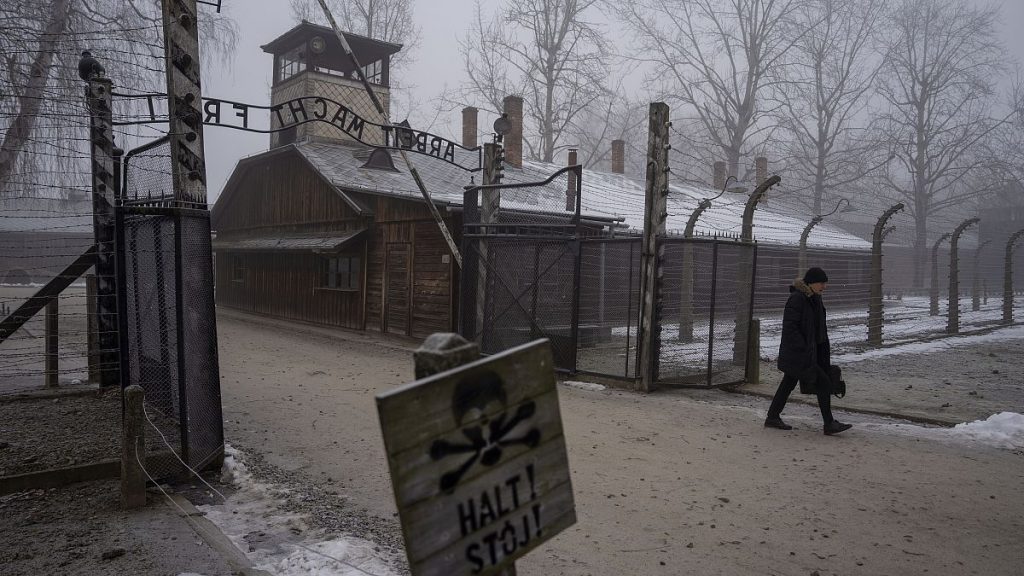The 80th anniversary of the liberation of Auschwitz-Birkenau, the notorious Nazi concentration and extermination camp, will be commemorated on January 27th. This solemn event will be held at the site itself, with a specially constructed tent erected over the camp’s main gate, infamously known as the “Death Gate.” The ceremony will be attended by Holocaust survivors, international dignitaries, representatives of various organizations, and Polish officials. The focus will remain on the testimonies of survivors, emphasizing the human tragedy at the heart of this historical event, with no political speeches planned. The historical weight of the location, where over a million people were systematically murdered, including approximately one million Jews, underscores the importance of remembering the victims and learning from the atrocities committed. The presence of survivors offers a powerful, personal connection to the past, ensuring that their experiences and the lessons of the Holocaust are not forgotten.
The planned attendance of international leaders, including potentially Israeli Prime Minister Benjamin Netanyahu, has added a layer of political complexity to the commemoration. Netanyahu is currently subject to an International Criminal Court (ICC) arrest warrant for alleged war crimes. Poland, as an ICC member state, is obligated to arrest individuals under warrant. However, the Polish government has issued assurances that Netanyahu would not be arrested if he attends the ceremony. This decision highlights the tension between international legal obligations and the desire to facilitate participation in this significant historical remembrance. The case also illustrates the limitations of the ICC’s enforcement power, as several other member states have also indicated they would not arrest Netanyahu.
The backdrop of rising antisemitism across Europe further underscores the significance of the Auschwitz commemorations. Recent surveys by the European Union Agency for Fundamental Rights revealed a concerning increase in antisemitic incidents, both online and in person. This alarming trend, coupled with the ongoing conflict in the Middle East and the subsequent rise in antisemitic rhetoric, emphasizes the urgent need to combat prejudice and promote tolerance. The commemoration serves as a stark reminder of the dangers of unchecked hatred and the importance of upholding human rights and dignity for all.
Auschwitz-Birkenau stands as a chilling testament to the horrors of the Holocaust. More than 1.1 million people were systematically murdered within its walls, the vast majority of whom were Jewish. However, the victims also included Poles, Roma, Soviet prisoners of war, and others targeted by the Nazi regime. The camp’s existence represents a calculated effort to exterminate entire populations based on ethnicity, religion, and political beliefs. The sheer scale of the atrocities committed at Auschwitz-Birkenau underscores the devastating consequences of unchecked hatred and intolerance. The 80th anniversary commemoration serves as a crucial opportunity to reflect on these horrors, to honor the victims, and to reaffirm the commitment to prevent such atrocities from ever happening again.
The liberation of Auschwitz-Birkenau by Soviet troops on January 27, 1945, marked a turning point in World War II and brought an end to the systematic extermination at the camp. This date has since been designated as International Holocaust Remembrance Day, a global observance dedicated to remembering the victims of the Holocaust and promoting education about this dark chapter in human history. The liberation itself offered a glimmer of hope amidst the unimaginable suffering, reminding us of the resilience of the human spirit and the importance of fighting for justice and human rights.
The 80th anniversary commemoration at Auschwitz-Birkenau carries immense weight, serving as a powerful reminder of the Holocaust’s devastating impact. The gathering of survivors, international leaders, and representatives from various organizations underscores the global commitment to remembering the victims and preventing future atrocities. The backdrop of rising antisemitism across Europe adds urgency to the commemoration, emphasizing the ongoing need to combat hatred and prejudice. The ceremony at Auschwitz-Birkenau stands as a sobering testament to the consequences of unchecked intolerance and a call to action to uphold human rights and dignity for all. The testimonies of survivors provide a profound connection to the past, ensuring that the lessons of the Holocaust are not forgotten, and the stories of those lost continue to resonate through generations.














